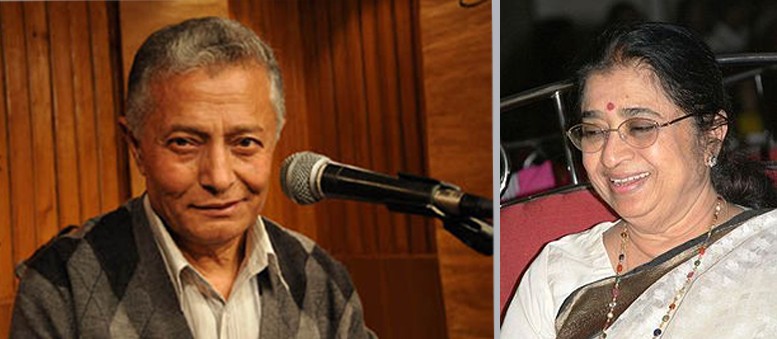Here are five classic Nepali songs that refuse to die

Alisha Sijapati / Kathmandu: Living in a house with three different generations—a 93-year-old grandmother, a 53-year-old father and 27-year-old me—I grew up listening to old Nepali songs. These classics are not just favourites in my household but they also continue to resound across the nation, played on laptops and bluetooth speakers through Youtube, and are still in rotation on the radio.
Although, there have been many covers and remixes of these classic tunes, nothing can compare to their timeless charm, and the personas of their legendary singers. These songs may be old but they’ve lost none of their lustre. Here are my pick for five classic Nepali songs:
Namana laaj estari—Premdhoj Pradhan and Usha Mangeshkar
Maitighar was released in 1966 and went to become outrageously successful as the first Nepali film ever produced under a private banner. Maitighar, even after 53 years, remains evergreen, not just because of its plot and the crackling chemistry between co-stars Mala Sinha and CP Lohani, but also for its magical songs that remain popular with millenials.
The film’s title song—‘Yo ho mero praan bhanda pyaaro, maitighar’, sung by the legendary Indian singer Asha Bhosle, still remains a popular tune for dance performances in cultural shows. However, for me, Na maana laaj estari—which showcases the romance between Sinha and Lohani and was sung by Bhosle’s sibling, Usha Mangeshkar—remains a favourite. A fun fact, Maitighar is the first Nepali film where all three Mangeshkar sisters—Lata, Usha and Asha—lent their voices.
The song Na maana laaj estari, pictures a newly-married couple singing to one another. The classic duet with Nepali crooner Premdhoj Pradhan playing off of Usha Mangeshkar is romantic and playful. Scored by Indian musician Jaidev, the song is smooth, taking you away to a dreamland of yesteryear.
Katar katar ma—Ram Thapa and Tara Thapa
Ram Thapa and Tara Thapa’s Katar katar ma, even though it came out decades ago, is still a popular record for Nepali weddings, particularly for its banter between a mother and her son-in-law. This song may not be as familiar with Nepali millennials as the others on this list, but if heard once, you’d want to hear it again. This song is neither about romance, heartbreak nor patriotism—it is a light-hearted number where a hopeless romantic is in a bid to impress his potential mother-in-law to give him her daughter’s hand in marriage.
“Katar katar ma, timro jhilke jwai aayo motor ma,” these lyrics make your heart go warm and are still relevant if you’d like to banter with your potential in-laws. “Timi chau ki sampati takne, swasni bhanda, dhan pyaro lagne, goru byaudaina, hoo goru byaudaina.”
If you may not know the entire lyrics, “katar katar ma” is enough to have anyone singing along incessantly.
Jhimkaideu pareli—Danny Denzongpa
With his chiseled good-looks and gruff demeanour, Sikkimese actor Danny Denzongpa was eye-candy for Nepali women in the 70s and 80s. He made a name for himself in the Indian film industry with films such as Love Story, Agneepath, Khuda Gawah and The Burning Train. While Denzongpa was already a popular bad boy in Bollywood during the 70s, he was also equally famous for his peppy Nepali songs.
Denzongpa’s songs, such as Raato rani phule jhai sanjha ma, Aage aage topai ko gola, Heu bhanda chiso, were breaking records in northern India and Nepal, when they came out on the radio. These songs went to became anthems for all. However, his other popular song, Jhimkaideu pareli, which was released between 1975-1978 had everyone swinging on the dance floor.
Jhimkaideu pareli starts with a loud tambourine that provides a toe-tapping rhythm to this old song. The song also heavily features traditional instruments—madal, flute and tambourine—which lend a Nepali touch to this classic dance number. Even the lyrics are catchy and simple enough for people to sing along—‘Jhimkaideu pareli mann ma bajcha mitho murali”—was on everyone’s tongues for more than a decade.
Yo joban timilai deula—Kumar Basnet
While Elvis Presley and Roy Orbison were ruling the rock-pop charts in the US, Kumar Basnet had everyone grooving to his music in Nepal. The funky song Deula yo joban timilai deula may be similar to what was trending internationally, but Basnet has given it a twist of his own. This song arguably introduced rock and pop to the entire nation. Kumar Basnet became a heartthrob in Nepal, when the song was released via Radio Nepal.
Called the Elvis Presley of Nepal, the climax of this famous song, “Dharti ki raani, timro jawani, yo joban timilai deulaaa” had everyone crooning to his songs because of its modern elements, which came like a breath of fresh air in a music scene dominated by traditional tunes..
Nakkali lai bhagai lagyo—Saroj Gopal
Before rock, pop or modern music took over Nepal, the entire country enjoyed music through the only radio channel—Radio Nepal, where many singers would wait for years to get a golden opportunity to sing for the nation. During those days, Saroj Gopal was a pioneer whose songs were hummed by everyone who listened to the radio, and at that time, that meant everyone.
When creativity boomed, this was one song that had everyone singing along.
The literal summary of the song goes to describe a handsome boy eloping with a beautiful girl and the ensuing trouble the two lovebirds got into. “Nakkali lai bhagai lagyo jhilke le, jhilke lai taal paryo, timi haami sojhalai fakkai ma gaal paryo.” During those days, when love marriages were rare, this song used to tease couples in love. Courtesy: Ekantipur
